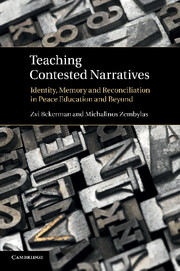Book contents
- Frontmatter
- Contents
- Acknowledgments
- Permissions
- Part I Introduction and theoretical underpinnings
- Part II Living and teaching contested narratives
- Part III Mourning, forgiveness and reconciliation
- Part IV Conclusions
- 11 Becoming critical design experts in schools
- 12 Memory and forgetting
- 13 De-essentializing identity
- 14 Designing different paths for reconciliation pedagogies
- References
- Index
13 - De-essentializing identity
Published online by Cambridge University Press: 05 December 2011
- Frontmatter
- Contents
- Acknowledgments
- Permissions
- Part I Introduction and theoretical underpinnings
- Part II Living and teaching contested narratives
- Part III Mourning, forgiveness and reconciliation
- Part IV Conclusions
- 11 Becoming critical design experts in schools
- 12 Memory and forgetting
- 13 De-essentializing identity
- 14 Designing different paths for reconciliation pedagogies
- References
- Index
Summary
As we argued in the introductory part of this book, peace education seems to be mostly guided by discourses which strongly emphasize “identity.” This is done almost without problematizing identity as a possible unnatural construct and or an artificially naturalized one. Instead, identity is assumed to be a given, a pre-existing category, as shown poignantly through the narratives and practices of teachers and students in several chapters of this book. As we reiterate below, the concept of identity and the coming into being of the political organization of the nation state are intimately related and should be taken into serious consideration when trying to understand the possible outcomes of peace educational efforts, as well as the educational strategies that should be adopted to improve them. For this to happen, teachers and students as critical design experts need to engage in the strategy of problematizing this intimate relationship and eventually de-essentializing identity. The aim of this chapter, then, is to analyze further what we can learn from this strategy in peace education frameworks.
Adults and children: their differential concerns about identity
The various events described in this book have in common the political context from within which they evolve; that is, they are all produced in societies which are still in or are slowly moving out of situations of intractable conflict. These conflicts involve states or other actors with a long sense of historical grievance, polarized perceptions of hostility and enmity; they also involve intangible issues such as values, beliefs and identity. As the events shared in the book clearly show, the attitudes of adults and children seem to reflect very different approaches and understandings to the construct of identity and its relevance within the social context which foregrounds it. Many adults in the two societies we come from appear concerned when children do not demonstrate awareness of their religious or national identities; yet at least in the school context these categorizations seem to be of little concern to the children themselves. These adults seem to be captive to hegemonic perspectives of an identity which is somewhat essentialized and reflects deep-rooted issues that stand at the basis of the protracted nature of the conflict they are trying to resolve. Children, not yet fully socialized into the historical realities which gave birth to the conflict, seem not to hold to an understanding of identity as a boundary marker, especially not one which delimits their spheres of social contact.
- Type
- Chapter
- Information
- Teaching Contested NarrativesIdentity, Memory and Reconciliation in Peace Education and Beyond, pp. 213 - 223Publisher: Cambridge University PressPrint publication year: 2011

